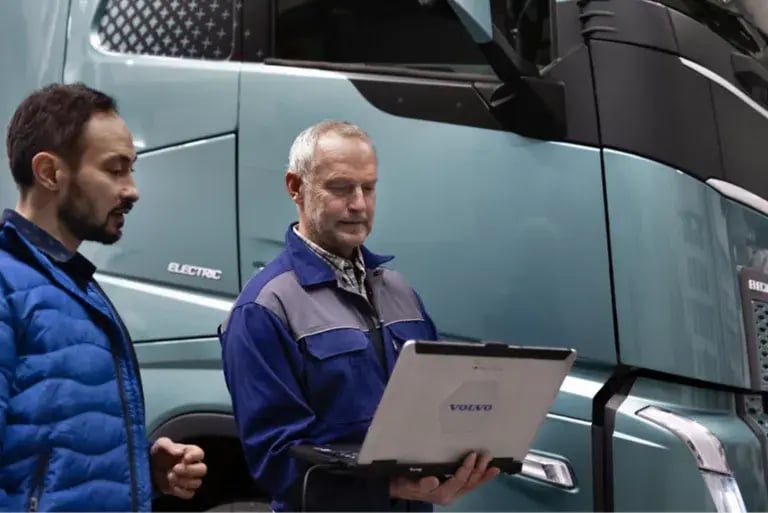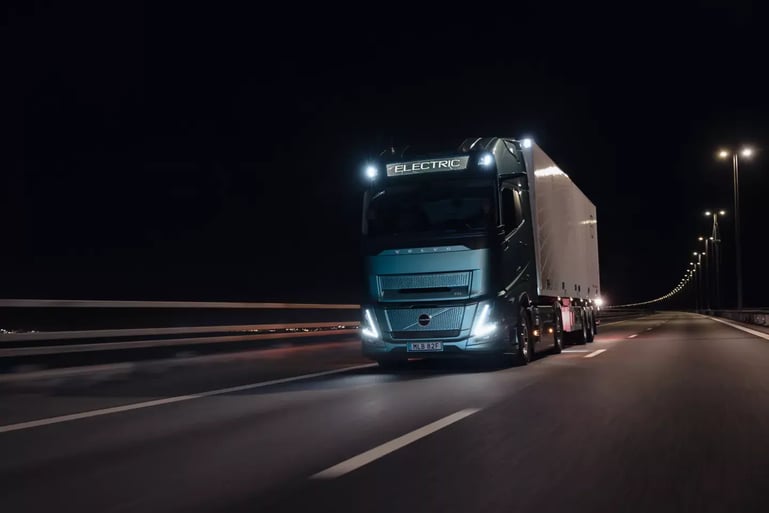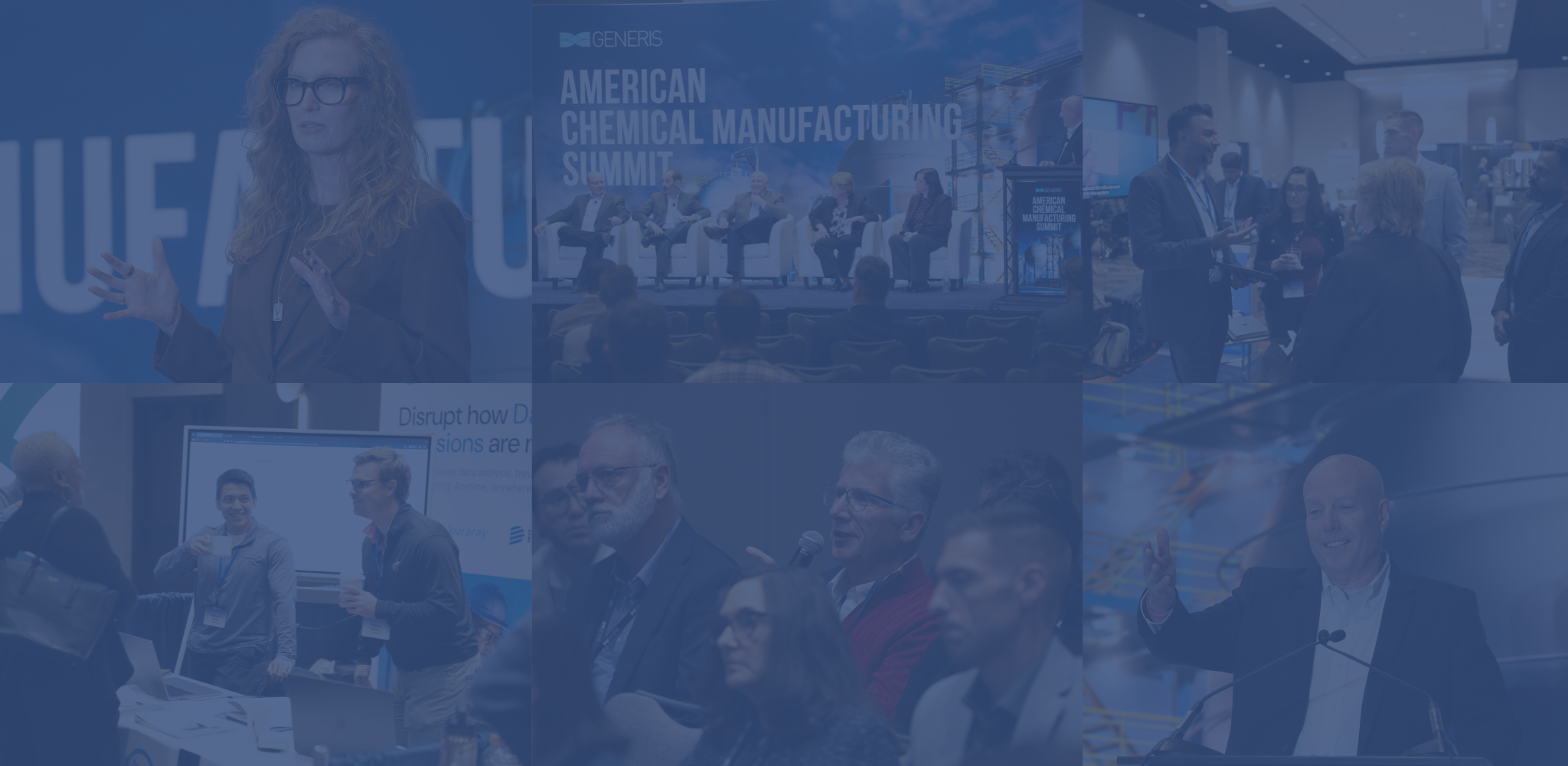Jenny Westermark, Senior Vice President of GTO Production Logistics at Volvo Group, has dedicated over two decades to shaping global logistics strategies and driving sustainability within one of the world’s leading transport and infrastructure providers.
In this conversation, she shares how Volvo Group is tackling the logistical challenges of electrification, embedding sustainability into every layer of its supply chain, and fostering inclusive leadership to power the future of transport.
Don’t miss the chance to hear Jenny’s full session and connect with her and other senior leaders driving transformation across Europe’s supply chains. Secure your spot today at the European Supply Chain Summit.
Could you begin with a brief introduction about yourself and an overview of your responsibilities as the SVP, GTO Production Logistics at Volvo Group?
.webp?width=443&height=443&name=1677682114133%20(5).webp) I am Jenny Westermark, a dedicated leader in Production Logistics at Volvo Group. With a career since 2003, I have had the privilege of holding various international roles within the organization, where I have contributed to shaping and executing global logistics strategies.
I am Jenny Westermark, a dedicated leader in Production Logistics at Volvo Group. With a career since 2003, I have had the privilege of holding various international roles within the organization, where I have contributed to shaping and executing global logistics strategies.
Currently, I oversee the entire scope of Production Logistics, which includes responsibilities of the entire Sales and Order Planning process, purchasing and execution of inbound and outbound transportation, and optimizing both internal and external logistics flows, including customs and trade. My role also encompasses overseeing packaging operations to ensure efficiency and sustainability.
What motivates me most is the opportunity to empower teams and contribute to building a more sustainable future for upcoming generations. I am committed to combining operational excellence with a human-centered approach—leading with purpose, nurturing talent, and continuously innovating to create meaningful impact.
As Volvo Group focuses on electrifying transport networks and shifting to fossil-free fuels, what are some of the logistical hurdles faced in scaling these initiatives across diverse regions and vehicle types?
Volvo’s electrification journey began five years ago, with around 8,000 battery-electric trucks sold across 48 countries. Scaling up electric truck production and deployment presents several logistical challenges, primarily related to building the necessary infrastructure. This includes developing a robust electrical grid and extensive charging networks that can support diverse vehicle types and regional requirements.
Carbon pricing is essential to accelerate this transition. By assigning a cost to emissions, it promotes fair competition and encourages companies to adopt low-emission vehicles, making sustainability more economically viable.
Finally, fostering a collaborative ecosystem across industries is the practical driving force behind sustainable innovation. As the saying goes, "transportation is a lifeline of prosperity." Supporting data from the United States shows that over 70% of everyday goods are transported by trucks, and global cargo volume is projected to increase fivefold since 2010. Addressing these logistical challenges is critical to ensuring sustainable growth and prosperity in the future.
As an SVP overseeing production logistics, what steps have you taken to foster a culture of sustainability throughout the supply chain?
I am committed to embedding sustainability into every aspect of our supply chain operations. To achieve this, we’ve set measurable goals aligned with Volvo Group’s broader sustainability vision—such as reducing CO₂ emissions, increasing the use of renewable energy, and minimizing waste across our logistics network.
Collaboration is central to our approach; we actively engage suppliers, carriers, and other stakeholders to share best practices, establish common sustainability standards, and drive collective action.
Sustainability is now a core part of our decision-making processes in procurement and logistics planning. We prioritize partners who demonstrate strong environmental performance and innovation. To build awareness internally, we’ve launched targeted training programs and communication campaigns that help employees understand their role in achieving our environmental objectives.
By fostering this culture of sustainability, we aim not only to reduce our environmental footprint but also to create long-term value for our customers, partners, and society at large.

As the SVP of GTO Production Logistics, how do you approach the challenge of integrating production logistics with broader corporate strategies at Volvo Group, especially in terms of digital transformation and sustainability?
Volvo operates as a provider of products and services to the transport industry and within Production Logistics we are seen internally as a key player within our own supply chain, This dual perspective offers us valuable insights and a comprehensive understanding of industry dynamics, both current and future—especially as we advance the electrification of road transport.
By sharing our insights with transport service providers and transport service buyers, we actively contribute to two strategic objectives of Volvo Group
We promote innovative logistics solutions and information standards to boost efficiency and sustainability across the ecosystem. At the same time, we help redesign logistics systems to support electrification, reinforcing Volvo’s leadership in sustainable transport and driving product and service growth.
Through our own transport company, Assar Haulage, we test and develop new offerings, gaining firsthand operational experience. This helps us better understand customer challenges and align innovations with industry needs.
"We promote innovative logistics solutions and information standards to boost efficiency and sustainability across the ecosystem. At the same time, we help redesign logistics systems to support electrification, reinforcing Volvo’s leadership in sustainable transport and driving product and service growth."
Looking forward, what is Volvo Group's long-term vision for sustainable logistics?
Volvo Group envisions a future where logistics is 100% more sustainable, 100% productive and 100% safer. Our long-term goal is sustainable growth and to lead the transformation of the transport and logistics industry by pioneering innovative solutions that significantly reduce environmental impact while enhancing operational performance.
Central to this vision is the achievement of zero emissions through the development and deployment of a comprehensive portfolio of zero-emission vehicles, including electric, hydrogen, and other alternative fuel-powered solutions.
What actions has Volvo Group taken to promote diversity and inclusion within its leadership team?
Volvo Group is committed to building a diverse and inclusive leadership team that reflects our global business and communities. We’ve implemented comprehensive DEI policies and actively promote diverse candidate pools through targeted recruitment and partnerships. Leadership teams participate in regular training on unconscious bias, cultural competence, and inclusive practices to foster a supportive environment.
We’ve set specific diversity targets and track progress using key performance indicators, with accountability built into performance evaluations. Affinity groups are encouraged to amplify underrepresented voices and influence policy. Our top executives publicly support DEI initiatives, and we maintain transparency by regularly communicating progress and challenges to drive continuous improvement.

How important has mentorship been in your career, and what advice would you give to women looking to break through leadership barriers in the logistics industry?
Mentorship has been a vital component of my career development. Having mentors who provided guidance, support, and valuable insights has helped me navigate challenges, identify growth opportunities, and build confidence in my leadership journey. Mentors serve as both advisors, opening doors and offering perspectives that might otherwise be overlooked.
For women aspiring to break through leadership barriers in the logistics industry, my key advice is to seek out mentors and build a strong professional network. Don't hesitate to ask for guidance and be proactive in pursuing development opportunities. It’s also important to cultivate resilience, stay true to your values, and continuously develop your skills. The industry is evolving rapidly, and diverse leadership perspectives are essential for driving innovation and sustainable growth. Embrace your unique strengths, advocate for yourself, and remember that perseverance and authenticity are powerful tools in overcoming obstacles and achieving your leadership ambitions.
Which aspect of the European Supply Chain Summit are you most looking forward to?
I am most looking forward to engaging with industry peers and thought leaders at the European Supply Chain Summit to exchange insights and best practices. The event provides a valuable platform to explore innovative solutions, discuss emerging trends, and collaborate on strategies that drive sustainability, digital transformation, and resilience within supply chains.
I am particularly eager to participate in discussions that focus on the future of sustainable logistics and the role of technology in shaping more efficient and environmentally responsible supply networks. Overall, I see this summit as an excellent opportunity to learn, share, and contribute to shaping the future of supply chain management across Europe and beyond.
A special thank you to Jenny Westermark for sharing such valuable perspectives. To dive deeper into these insights and exchange ideas directly with industry leaders, join us on site at the European Supply Chain Summit in Antwerp this October.
%20(1).png?width=773&height=112&name=Generis%20Logo%20full%20Colour%20(Large)%20(1).png)

.png)
-2.png)
